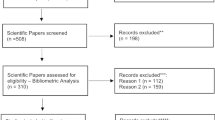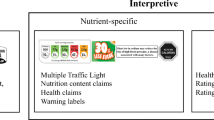Abstract
Can moral appeals motivate individuals to choose less carbon-intensive diets? In a survey-embedded forced-choice conjoint experiment involving 1520 US respondents, we asked participants to compare two menus across six dimensions: (1) burger/sandwich patty type and its corresponding carbon footprint value, (2) calories, (3) protein, (4) price, (5) ingredient origin, and (6) farming method. Within each menu, the values for these dimensions varied randomly. Further, respondents were randomly assigned to three frames: a reference frame that highlighted the scientific rationale for pro-climate action, and treatment frames with a moral-secular and a moral-religious framing of pro-climate action. We found that moral appeals did not influence individuals to make low-carbon food choices. Across the entire sample, respondents tended to favor non-vegetarian options with higher carbon footprints. Those who prioritized taste were less inclined to choose the vegetarian menu. However, some subgroups did show a preference for the vegetarian menu, including women, those with pro-climate attitudes and prior exposure to a vegetarian diet, and those who considered the health impact of their food choices. In conclusion, it appears that moral appeals are unlikely to drive significant changes in individual food choices toward a more climate-friendly food system. Instead, dietary preferences are primarily shaped by individuals’ pre-existing climate attitudes and demographics.




Similar content being viewed by others
Data availability
The datasets generated for the current study are posted on the Harvard Dataverse repository, https://doi.org/https://doi.org/10.7910/DVN/FVGXJT, and will be made publicly available once the paper is published.
References
Aung M, Chang Y (2014) Traceability in a food supply chain: safety and quality perspectives. Food Control 39:172–184
Auspurg K, Hinz T (2014) Factorial survey experiments Vol. 175 Sage Publications
Bain PG, Bongiorno R (2020) It’s not too late to do the right thing: moral motivations for climate change action. Wiley Interdiscip Rev: Clim Change 11(1):e615
Bansak K, Hainmueller J, Hopkins DJ, Yamamoto T, Druckman JN, Green DP (2021) Conjoint survey experiments. Adv Exp Polit Sci 19:19–41
Bechtel MM, Scheve KF (2013) Mass support for global climate agreements depends on institutional design. Proc Natl Acad Sci 110(34):13763–13768
Bénabou R, Ticchi D, Vindigni A (2015) Religion and innovation. Am Econ Rev 105(5):346–351
Berinsky A, Margolis M, Sances M (2016) Can we turn shirkers into workers? J Exp Soc Psychol 66:20–28
Booth SL, Sallis JF, Ritenbaugh C, Hill JO, Birch LL, Frank LD, Glanz K et al (2001) Environmental and societal factors affect food choice and physical activity: rationale, influences, and leverage points. Nutr Rev 59(3):S21–S36
Bryngelsson D et al (2016) How can the EU climate targets be met? A combined analysis of technological and demand-side changes in food and agriculture. Food Policy 59:152–164
Chong D, Druckman J (2007) Framing theory. Annu Rev Polit Sci 10:103–126
Clark M, Domingo N, Colgan K, Thakrar S, Tilman D, Lynch J, Azevedo I, Hill J (2020) Global food system emissions could preclude achieving the 1.5 and 2 C climate change targets. Science 370(6517):705–708
Corner A, Markowitz E, Pidgeon N (2014) Public engagement with climate change: the role of human values. Wiley Interdiscip Rev Clim Change 5(3):411–422
Curtis KA, Olson LR (2019) Identification with religion: cross-national evidence from a social psychological perspective. J Sci Study Relig 58(4):790–812
Day MV, Fiske ST, Downing EL, Trail TE (2014) Shifting liberal and conservative attitudes using moral foundations theory. Pers Soc Psychol Bull 40(12):1559–1573
Dickinson JL, McLeod P, Bloomfield R, Allred S (2016) Which moral foundations predict willingness to make lifestyle changes to avert climate change in the USA? PLoS ONE 11(10):e0163852
Dolšak N, Prakash A (2022) Different approaches to reducing aviation emissions: reviewing the structure-agency debate in climate policy. Npj Clim Action 1(1):2
Dunlap RE, McCright AM (2008) A widening gap: Republican and Democratic views on climate change. Environ Sci Policy Sustain Dev 50(5):26–35
Feinberg M, Willer R (2013) The moral roots of environmental attitudes. Psychol Sci 24(1):56–62
Feygina I, Jost JT, Goldsmith RE (2010) System justification, the denial of global warming, and the possibility of system-sanctioned change. Pers Soc Psychol Bull 36(3):326–338
Food and Agriculture Organization (FAO) (2021) OECD-FAO Agricultural Outlook 2021–2023: Meat. https://www.fao.org/3/cb5332en/Meat.pdf. Accessed 15 June 2023
Fornara F, Molinario E, Scopelliti M, Bonnes M, Bonaiuto F, Cicero L, Admiraal J, Beringer A, Dedeurwaerdere T, de Groot W, Hiedanpää J (2020) The extended value-belief-norm theory predicts committed action for nature and biodiversity in Europe. Environ Impact Assess Rev 81:106338
Francis P (2019) Laudato Si’: on care for our common home. Ideals and Ideologies, Routledge pp. 503–510
Franco A, Malhotra N, Simonovits G, Zigerell L (2017) Developing standards for post-hoc weighting in population-based survey experiments. J Exp Polit Sci 4(2):161–172
Gadema Z, Oglethorpe D (2011) The use and usefulness of carbon labelling food: a policy perspective from a survey of UK supermarket shoppers. Food Policy 36(6):815–822
Gheihman N (2021) Veganism as a lifestyle movement. Sociol Compass 15(5):e12877
Godfray H, Aveyard P, Garnett T, Hall J, Key T, Lorimer J, Pierrehumbert R, Scarborough P, Springmann M, Jebb S (2018) Meat consumption, health, and the environment. Science 361(6399):eaam5324
Graham J, Haidt J, Nosek BA (2009) Liberals and conservatives rely on different sets of moral foundations. J Pers Soc Psychol 96:1029–1046
Graham J, Haidt J, Koleva S, Motyl M, Iyer R, Wojcik SP, Ditto PH (2013) Moral foundations theory: the pragmatic validity of moral pluralism. In Advances in Experimental Social Psychology (Vol. 47, pp. 55–130) Academic Press
Grasso M, Markowitz EM (2015) The moral complexity of climate change and the need for a multidisciplinary perspective on climate ethics. Clim Change 130:327–334. https://doi.org/10.1007/s10584-014-1323-9
Haidt J (2013) The righteous mind: why good people are divided by politics and religion. Random House Digital Inc, New York
Haidt J, Joseph C (2004) Intuitive ethics: how innately prepared intuitions generate culturally variable virtues. Daedalus 133(4):55–66
Hainmueller J, Hopkins DJ, Yamamoto T (2014) Causal inference in conjoint analysis: understanding multidimensional choices via stated preference experiments. Polit Anal 22(1):1–30
Hallström E, Carlsson-Kanyama A, Börjesson P (2015) Environmental impact of dietary change: a systematic review. J Clean Prod 91:1–11
Harden J, Sokhey A, Runge K (2019) Accounting for noncompliance in survey experiments. J Exp Polit Sci 6(3):199–202
Heinberg R, Fridley D (2016) Our renewable future: laying the path for one hundred percent clean energy. Island Press
Herchenroeder L, Forestell CA, Bravo AJ (2023) The effectiveness of animal welfare-, environmental-, and health-focused video appeals on implicit and explicit wanting of meat and intentions to reduce meat consumption. J Soc Psychol 163(3):394–407
Hobolt SB, Leeper TJ, Tilley J (2021) Divided by the vote: affective polarization in the wake of the Brexit referendum. Br J Polit Sci 51(4):1476–1493
Iyer S (2016) The new economics of religion. J Econ Lit 54(2):395–441
Jamieson D (1992) Ethics, public policy, and global warming. Sci Technol Human Values 17(2):139–153
Kahan D (2010) Fixing the communications failure. Nature 463:296–297
Kidwell B, Farmer A, Hardesty DM (2013) Getting liberals and conservatives to go green: political ideology and congruent appeals. J Consum Res 40(2):350–367
Krosnick JA, Judd CM, Wittenbrink B (2018) The measurement of attitudes. In: The handbook of attitudes, vol 1: basic principles. Routledge, pp 45–105
Lama D, Dalai Lama XIV Bstan-ʼdzin-rgya, Alt F (2020) Our only home: a climate appeal to the world. Bloomsbury Publishing
Leeper TJ, Hobolt SB, Tilley J (2020) Measuring subgroup preferences in conjoint experiments. Polit Anal 28(2):207–221
Lenski G (1971) The religious factor in Detroit: revisited. Am Sociol Rev 36(1):48–50
Lind H, Nordfjærn T, Jørgensen S, Rundmo T (2015) The value-belief-norm theory, personal norms and sustainable travel mode choice in urban areas. J Environ Psychol 44:119–125
Lynn M, Oldenquist A (1986) Egoistic and nonegoistic motives in social dilemmas. Am Psychol 41(5):529
Maibach E, Roser-Renouf C, Leiserowitz A (2009) Global warming’s six Americas 2009: an audience segmentation analysis. New Haven, CT: Yale University and George Mason University, Yale Project on Climate Change Communication
Margolis MF, Sances MW (2017) Partisan differences in nonpartisan activity: the case of charitable giving. Polit Behav 39:839–864
Markowitz E, Shariff A (2012) Climate change and moral judgment. Nat Clim Chang 2:243–247
Mathur MB, Peacock J, Reichling DB et al (2021) Interventions to reduce meat consumption by appealing to animal welfare: meta-analysis and evidence-based recommendations. Appetite 164:105277
McCollum D, Krey V, Kolp P, Nagai Y, Riahi K (2014) Transport electrification: a key element for energy system transformation and climate stabilization. Clim Change 123:651–664
McDonald J (2020) Avoiding the hypothetical: why “Mirror experiments” are an essential part of survey research
McRight AM (2010) The effects of gender on climate change knowledge and concern in the American public. Popul Environ 32(1):66–87. https://doi.org/10.1007/s11111-010-0113-1
Michel F, Knaapila A, Hartmann C, Siegrist M (2021) A multi-national comparison of meat eaters’ attitudes and expectations for burgers containing beef, pea or algae protein. Food Qual Prefer 91:104195
Modlinska K, Adamczyk D, Maison D, Pisula W (2020) Gender differences in attitudes to vegans/vegetarians and their food preferences, and their implications for promoting sustainable dietary patterns–a systematic review. Sustainability 12(16):6292
Moser SC, Dilling L (2007) Toward the social tipping point: creating a climate for change Creating a climate for change. Communicating climate change and facilitating social change pp. 491–516
Mrchkovska N, Dolšak N, Prakash A (2023) Pope Francis, climate message, and meat tax: evidence from survey experiment in Italy. Npj Climate Action 2(1):10
Mutz DC (2021) Improving experimental treatments in political science. Adv Exp Political Sci 219
Newell B, Pitman A (2010) the psychology of global warming: improving the fit between the science and the message. Bull Am Meteor Soc 91(8):1003–1014
Nielsen KS, Brick C, Hofmann W et al (2022) The motivation–impact gap in pro-environmental clothing consumption. Nat Sustain 5:665–668
O'Brien K, Selboe E, Hayward B (2018) Exploring youth activism on climate change: dutiful, disruptive, and dangerous dissent. Ecol Soc 23(3):42
Olabi AG, Abdelkareem MA (2022) Renewable energy and climate change. Renew Sustain Energy Rev 158:112111
Ostrom E (2010) A multi-scale approach to coping with climate change and other collective action problems. Solutions 1(2):27–36
Our World in Data (2020) Per capita meat consumption by type. https://ourworldindata.org/grapher/per-capita-meat-type. Accessed 15 June 2023
Paxton Joseph, Bruni Tommaso, Greene Joshua (2014) Are ‘counter-intuitive’ deontological judgments really counter-intuitive? An empirical reply to Kahane et al. (2012). Soc Cogn Affect Neurosci 9(9):1368–71
Pew Research Center (2018) Americans are far more religious than adults in other wealthy nations. Washington D.C. Retrieved 15 June 2023. https://www.pewresearch.org/short-reads/2018/07/31/americans-are-far-morereligious-than-adults-in-other-wealthy-nations/
Poore J, Nemecek T (2018) Reducing food’s environmental impacts through producers and consumers. Science 360(6392):987–992
Poortinga W, Spence A, Demski C, Pidgeon NF (2012) Individual-motivational factors in the acceptability of demand-side and supply-side measures to reduce carbon emissions. Energy Policy 48:812–819
Rees JH, Klug S, Bamberg S (2015) Guilty conscience: motivating pro-environmental behavior by inducing negative moral emotions. Clim Change 130:439–452
Rozin P, Markwith M, Stoess C (1997) Moralization and becoming a vegetarian: the transformation of preferences into values and the recruitment of disgust. Psychol Sci 8(2):67–73
Saxe H, Larsen TM, Mogensen L (2013) The global warming potential of two healthy Nordic diets compared with the average Danish diet. Clim Change 116:249–262
Schiermeier Q (2019) Eat less meat: UN climate-change report calls for change to human diet. Nature 572:291–292. https://doi.org/10.1038/d41586-019-02409-7
Schuldt JP et al (2017) Brief exposure to Pope Francis heightens moral beliefs about climate change. Clim Change 141:167–177
Schwartz SH (1977) Normative influences on altruism. Adv Exp Soc Psychol 10:221–279
Severson AW, Coleman EA (2015) Moral frames and climate change policy attitudes. Soc Sci Q 96(5):1277–1290
Sharma S, Ang JB, Fredriksson PG (2021) Religiosity and climate change policies. Energy Econ 101:105414
Shwom R et al (2010) Understanding US public support for domestic climate change policies. Glob Environ Chang 20(3):472–482
Simpson B, Willer R (2015) Beyond altruism: sociological foundations of cooperation and prosocial behavior. Ann Rev Sociol 41:43–63
Smith H (1983) Culpable ignorance. Philos Rev 92(4):543–571
Sörqvist P, Haga A, Langeborg L, Holmgren M, Wallinder M, Nöstl A, Seager PB, Marsh JE (2015) The green halo: mechanisms and limits of the eco-label effect. Food Qual Prefer 43:1–9
Springmann M et al (2018) Options for keeping the food system within environmental limits. Nature 562:519–525
Stark R, Glock CY (1965) The “New Denominationalism.” Rev Relig Res 7(1):8–17
Stern PC, Dietz T, Abel T, Guagnano GA, Kalof L (1999) A value-belief-norm theory of support for social movements: the case of environmentalism. Res Human Ecol 6(2):81–97
Sumpter K (2015) Masculinity and meat consumption: an analysis through the theoretical lens of hegemonic masculinity and alternative masculinity theories. Sociol Compass 9(2):104–114
Schwarz N (1999) Self-reports: how the questions shape the answers. American Psychol 54(2):93
Sydney Perelmutter M (2021) Leading countries in plant-based meat and dairy innovations. Retrieved 15 June 2023. https://xtalks.com/leading-countries-in-plant-based-meat-and-dairy-innovations-2634/
Taber KS (2018) The use of Cronbach’s alpha when developing and reporting research instruments in science education. Res Sci Educ 48:1273–1296
Thomas RM (1997) Moral development theories--secular and religious: a comparative study. Bloomsbury Publishing USA
Tobler C, Visschers VH, Siegrist M (2011) Eating green Consumers’ willingness to adopt ecological food consumption behaviors. Appetite 57(3):674–682
Van Lange PA, Joireman J, Parks CD, Van Dijk E (2013) The psychology of social dilemmas: a review. Organ Behav Hum Decis Process 120(2):125–141
Van Loo E, Caputo V, Nayga R, Meullenet JF, Crandall P, Ricke S (2010) Effect of organic poultry purchase frequency on consumer attitudes toward organic poultry meat. J Food Sci 75(7):S384–S397
Varaine S (2022) How dropping subjects who failed manipulation checks can bias your results: an illustrative case. J Exp Poli Sci 10(2):299–305
Vecchio R, Annunziata A (2015) Willingness-to-pay for sustainability-labelled chocolate: an experimental auction approach. J Clean Prod 86:335–342
Vermeulen S, Campbell B, Ingram J (2012) Climate change and food systems. Annu Rev Environ Resour 37:195–222
Wolsko C, Ariceaga H, Seiden J (2016) Red, white, and blue enough to be green: effects of moral framing on climate change attitudes and conservation behaviors. J Exp Soc Psychol 65:7–19
Zhang R, Fujimori S (2020) The role of transport electrification in global climate change mitigation scenarios. Environ Res Lett 15(3):034019
Author information
Authors and Affiliations
Contributions
All authors (Nela Mrchkovska, Nives Dolšak, Aseem Prakash) contributed equally to the paper and all authors approved the version to be published.
Corresponding author
Ethics declarations
Ethics approval
This research was exempt from the federal human subject regulations, including the requirement for IRB approval and continuing review per the University of Washington’s Human Subjects Division (STUDY00016191).
Conflict of interest
The authors declare no competing interests.
Additional information
Publisher's Note
Springer Nature remains neutral with regard to jurisdictional claims in published maps and institutional affiliations.
All authors (Nela Mrchkovska, Nives Dolšak, Aseem Prakash) contributed equally to the paper and all authors approved the version to be published
Supplementary Information
Below is the link to the electronic supplementary material.
Rights and permissions
Springer Nature or its licensor (e.g. a society or other partner) holds exclusive rights to this article under a publishing agreement with the author(s) or other rightsholder(s); author self-archiving of the accepted manuscript version of this article is solely governed by the terms of such publishing agreement and applicable law.
About this article
Cite this article
Mrchkovska, N., Dolšak, N. & Prakash, A. Morality meets menu: investigating the impact of moral appeals on vegetarianism through a conjoint survey experiment. Climatic Change 177, 38 (2024). https://doi.org/10.1007/s10584-024-03695-5
Received:
Accepted:
Published:
DOI: https://doi.org/10.1007/s10584-024-03695-5




